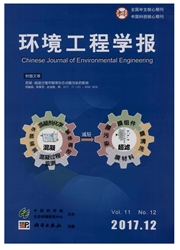

 中文摘要:
中文摘要:
采用批式实验讨论了氢自养还原菌在厌氧条件下,利用氢气作为电子供体还原地下水中对硝基氯苯的可行性及其影响因素。结果表明,氢自养菌能利用氢气生物还原对硝基氯苯,并产生中间产物对氯苯胺,继而进一步还原脱氯产生苯胺,该过程可提高对硝基氯苯的可生化性。对硝基氯苯在初始阶段还原速率较快,最高去除速率达到610μg/(L.d),随后逐渐降低达到稳定。影响因素实验表明,在一定浓度范围内提高对硝基氯苯浓度对其去除率影响较小,但硝基进一步还原和脱氯效果降低;氢自养菌还原硝基氯苯的最适宜pH值在7.0~8.0之间;水中的硝酸盐和对硝基氯苯对电子供体存在竞争,硝酸盐反硝化对对硝基氯苯还原具有抑制作用。
 英文摘要:
英文摘要:
The performance of autohydrogenotrophic bacteria using hydrogen as an electron donor for bioreduction of para-nitrochlorobenzene(p-NCB) under anaerobic conditions was studied with batch experiments.The results showed that,p-NCB could be bioreduced to para-chloroaniline(p-CAN) as an intermediate product by hydrogenotrophic bacteria using hydrogen,and then to aniline(AN) by dechlorinating so as to improve the biodegradability of p-NCB.p-NCB reduction rate at the initial phase was rapid(the maximum removal rate reached 610 μg/(L·d) and then reached a reasonable removal rate gradually.A series of short-term experiments were operated to study the influence of p-NCB loading,pH,and nitrate loading on p-NCB reduction.The results showed that increasing the concentrations of p-NCB affected insignificantly on their removal efficiency in limited concentrations,but the rates of further nitro reduction and dechlorination of p-CAN decreased.The high degradation rate was achieved at pH value 7.0 to 8.0.The existence of nitrate had an inhibitory effect on p-NCB reduction because of competition for electron donor between nitrate and p-NCB.
 同期刊论文项目
同期刊论文项目
 同项目期刊论文
同项目期刊论文
 High efficiency removal of 2-chlorophenol from drinking water by a hydrogen-based polyvinyl chloride
High efficiency removal of 2-chlorophenol from drinking water by a hydrogen-based polyvinyl chloride Characterization and flocculation mechanism of high efficiency microbial flocculant TJ-F1 from Prote
Characterization and flocculation mechanism of high efficiency microbial flocculant TJ-F1 from Prote 期刊信息
期刊信息
